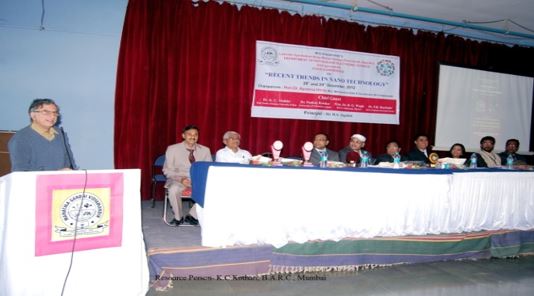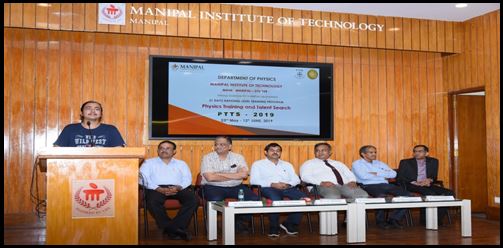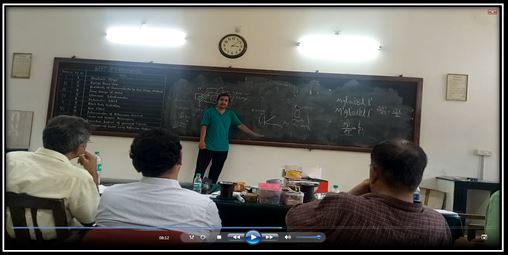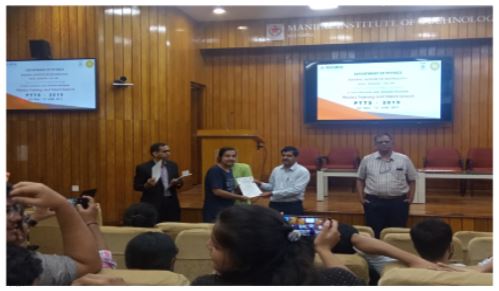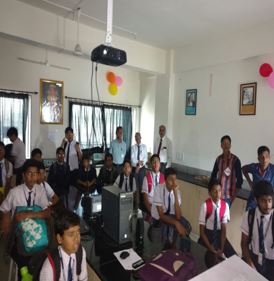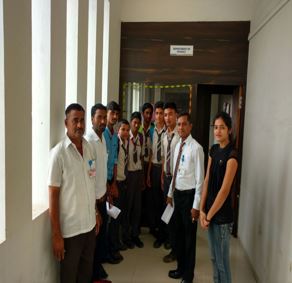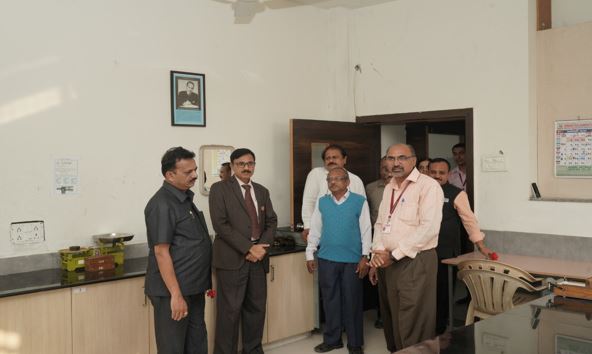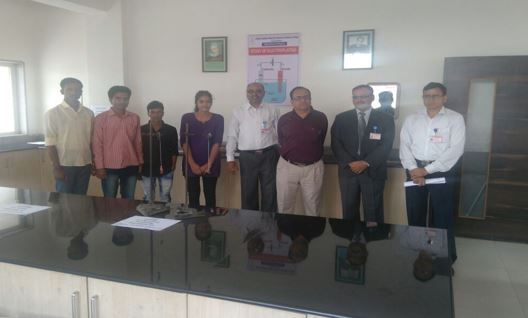Science Department
About the Department
The Department of Physics was established in 1971 and offers UG Program in Physics. The department has a well-equipped laboratory with adequate instruments for the regular Practical sessions. The department has experienced faculty who publish their scholarly research in reputed Journals. The department has maintained an enriched departmental library with Textbooks, Reference books and Magazines. The faculty of the department has designed a Practical Handbook useful for students as well as teachers. It contains detailed instructions for the practical in Physics. The faculty of the department has also written a textbook that is prescribed for S.Y. BSc. By the affiliating university. The faculty is keen on motivating and guiding the students of the department to write research articles and present them in seminars /conferences.The faculty in the department are engaged in extension activities through consultancy for Govt. Project of Atal Tinkering Lab.
Features of the Department
- Highly qualified faculty with diverse research interests
- A well-equipped laboratory to conduct experiments in Physics
- Enriched departmental library
- Practical Handbook designed by the faculty
- Motivating students for future research through Research Paper writing and presentation of the paper.
- Availing participation of the students in Avishkar and INNOFEST competitions
- Availing participation of the students in co-curricular and extra-curricular activities
| Sr.No | Name of the Faculty | Designation | |
|---|---|---|---|
| 1 | Prof. (Dr.) S. J. Patil | Professor | [email protected] |
| 2 | Prof. (Dr.) K. B. Bhamare | Professor | [email protected] |
| 3 | Dr. J. M. Shewale | Assistant Professor | [email protected] |
| 4 | Mr. K. S. Sonawane | Lecturer | [email protected] |
 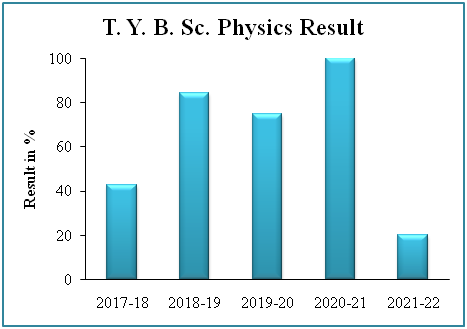 |
|||
|---|---|---|---|
T. Y. B. Sc. Physics Toppers |
|||
| Year | Rank | Name of the Student | |
| 2021-22 | 1 | PAWAR ASHWINI RAMESHWAR | |
| 2 | WAGH GAURAV SURESH | ||
| 3 | PAWAR AISHWARYA NAMDEV | ||
| 2020-21 | 1 | BORSE VRUSHALI LAXMAN | |
| 2 | SONAR BHUMICA SANJAY | ||
| 3 | JAMBHALE MANSI DIPAK | ||
| 2019-20 | 1 | SHARMA ABHISHEK SATYAVIR | |
| 2 | CHAVAN CHETAN RAJENDRA | ||
| 3 | VALVI MAYUR AVINASH | ||
| 2018-19 | 1 | SANDHU SIMARANPREETKAUR | |
| 2 | MANDAWADE ABHINAY SUBHASH | ||
| 3 | WAGH ASHISH SANTOSH | ||
| 2017-18 | 1 | KUMAVAT TRILOKCHAND LILADHAR | |
| 2 | ZADE VINOD WALMIK | ||
| 3 | GARDE MAYUR RAMKRISHNA | ||
Strengths:
- Research papers published regularly in National and International Journals.
- Research papers presented regularly in National and International Conferences.
- Organized International conference under coordination of staff of department.
- Involvement in various academic bodies of the college and university.
- Authored text book for S. Y. B. Sc. Physics students.
- Physics Laboratories are well furnished and well-equipped with various instruments and Software tools for regular practical. The Physics practical handbook has been prepared by the faculty of Physics Department for the use of both teachers and students by including detailed instructions on laboratory experiments related to the Physics.
- Industry based field project for T.Y.B .Sc. students
- MoUs with industries for training and placement.
- Collaborations, Linkages and MoUs with reputed institutions, industries and research laboratories for research work.
- Increment of ICT facilities and enrichment of E-content on subject related topics.
- Development of more research facilities for project based related characterization.
- Organization of Seminars/Workshops/ Conference related to advances in nanotechnology.
- Submission of proposals for Minor/Major research projects to various funding agencies.
- Hands on training workshop on advanced hardware and software tools.
- Publication of research papers in reputed UGC listed journals.
- Organization of placement camp and internship
- Coordination and monitoring of Atal Tinkering Laboratories work of various schools in Nashik city.
Future Plans
 |
|||
|---|---|---|---|
Toppers |
|||
| Year | Rank | Name of the Student | Percentage |
| 2017-18 | 1 | Mali Alisha | 72% |
| 2 | Pagare Aarti | 69.32% | |
| 3 | Sonawane Manisha | 65.50% | |
| 2018-19 | 1 | Maurya Deepshikha | 92.40% |
| 2 | Shaikh Nasara | 86.25% | |
| 3 | Gangurde Ketki | 74.58% | |
| 2019-20 | 1 | Ahirrao Akashay Vilas | 81% |
| 2 | Thakare Monali Ramdas | 76.17% | |
| 3 | Rajput Twinkle Rajkumar | 74% | |
| 2020-21 | 1 | Rahane Sweta Balasaheb | 83.58% |
| 2 | Prabale Nidhi Bharat | 81.67% | |
| 3 | Pawar Pranita Bharat | 78.75% | |
| 2021-22 | 1 | Borade Prajakta Sharad | 82.55% |
| 2 | Bhoye Yashashree Shravan | 81.73% | |
| 3 | Shaikh Aliya Salim | 77.95% | |
 |
|||
|---|---|---|---|
Toppers |
|||
| Year | Rank | Name of the Student | Percentage |
| 2017-18 | 1 | Boraste Kanchan Vilas | 72.08% |
| 2 | Deore Harshali Dattatray | 69.44% | |
| 3 | Nikam Sangita Balkrishna | 69.00% | |
| 2018-19 | 1 | Bhamare Ankita Vishwas | 73.32% |
| 2 | Shinde Jayshree Shubhas | 71.00% | |
| 3 | Peerzada Aayesha Nazim | 70.20% | |
| 2019-20 | 1 | Dhyani Neha Ramkumar | 78.76% |
| 2 | Qadri Qadriya Abdul Jabbar | 78.32% | |
| 3 | Jayaseelinn Chandra J | 69.72% | |
| 2020-21 | 1 | Bedage Ankit Dattatray | 77.30% |
| 2 | Wagh Dhanshree Dagadu | 76.90% | |
| 3 | Dund Pushpali Balkrishna | 72.60% | |
| 2021-22 | 1 | Magar Devendra Sanjay | 78.60% |
| 2 | Deore Jaywant Nandkumar. | 78.60% | |
| 3 | Ubale Gaurav Dagadu | 75.80% | |
Teaching Faculty
| Sr. No. | Photo | Name of the Faculty | Designation | Qualification | Teaching Experience | Link |
|---|---|---|---|---|---|---|
| 1 |  |
Prof. (Dr.) S. J. Patil | Head of Department & CEO | ( M. Sc. Ph.D.) | 32 | View/Read |
| 2 | 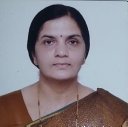 |
Prof. (Dr.). K.B. Bhamare | professor | M.Sc. Ph.D. | 32 | View/Read |
| 3 |  |
Dr.J.M.Shewale | Assistant professor | M.Sc. Ph.D. | 13 | View/Read |
| 4 | 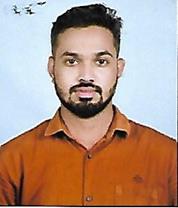 |
Mr. K.S.Sonawane | Lecturer | M. Sc | 02 | View/Read |
Linkages & Collaborations/ MOU’s
| Sr.NO | Name of the MoU/Collaboration/ linkage | Name of the collaborating agency / institution / industry / corporate house with whom the MoU / collaboration / linkage is made, with contact details | Year of signing MoU / collaboration / linkage | Duration of MoU / collaboration / linkage | Link to the relevant document |
|---|---|---|---|---|---|
| 1 | To inculcate various skills in unemployable youths to make them fit for employment | Yuvashakti Foundation (YUF) | 2019-20 | 02 Year | view |
| 2 | Training programme of JyotishVidnyan | Godavari JyotishVidnyanMandal, Nashik | 2021-22 | 05 Year | view |
List of Best Practices of Department
| Name of the activity | Links |
|---|---|
| Student’s participation in conferences/work-shop and paper publication | Click here |
Extension Activities
| Sr. No | Name of the activity | Date of Activity | No. of Participant | Link |
|---|---|---|---|---|
| 1 | Induction Programme | 30/10/2021 | 40 | Click here |
| 2 | Alumni meet | 11/02/2022 | 15 | Click here |
| 3 | National science day | 28/02/2022 | 20 | Click here |
| 4 | Farewell function | 02/03/2022 | 25 | Click here |
| 5 | Industrial visit | 02/03/2022 | 32 | Click here |
| 6 | Mobile Repairing workshop | 11 and 12/03/2022 | 42 | Click here |
| 7 | NSS camp visit at Jategaon | 13/03/2022 | 100 | Click here |
| 8 | Poster Presentation: INNOFEST | 24/04/2022 | 06 | Click here |
| 9 | Webinar: Preparation of competitive exam | 27/04/2022 | 80 | Click here |
| 10 | Project guidance | 23/05/2022 | 15 | Click here |
| 11 | ATL lab visit | 29/04/2022 | 26 | Click here |
- Dr. J. M. Shewale worked as associate research guide at research centre of Physics department of MGV’s M. S. G. Arts, Science and Commerce College, Malegaon camp, Nashik.
• Name List of Research Guides:
| Sr. No | Name of Research Guide | Designation | Position of Guide | Subject | University | Remark |
|---|---|---|---|---|---|---|
| 1 | Dr. J.M. Shewale | Assistant Professor | Regular Guide | Physics | S.P.P.U., Pune | 04 Registered for Ph.D. |
Enrolment of Ph. D. student under the guidance of Dr. J.M. Shewale
| Year | Male | Female | Total admitted | Remark |
|---|---|---|---|---|
| 2017-2018 | Nil | Nil | Nil | Work in Progress |
| 2018-2019 | Nil | Nil | Nil | Work in Progress |
| 2019-2020 | 01 | 00 | 01 | Work in Progress |
| 2021-2022 | 03 | 00 | 03 | Work in Progress |
Areas of research: Material Science
Enrolment of Ph. D. student under the guidance of Dr. J.M. Shewale
| Sr. No. | Name of the scholar | Title of the thesis | Ref. No. of registration approval | Degree awarded |
|---|---|---|---|---|
| 1 | Mr. Wakade Amol Machhindra | Hydrothermal synthesis and study of pure and modified nano structured LaCrO 3 for gas sensing application. | PGS/384 dated 20/01/2021 | Under Progress |
| 2 | Mr. Bhamare Rushikesh Gorakh | Study the influence of pH, RPM and time parameters on the structural, optical and gas sensing properties of Strontium oxide (SrO) thin film with different dopant developed by spin coating method. | PGS/1485 dated 05/04/2022 | Under Progress |
| 3 | Mr. Wagh Jitendra Bhalerao | Preparation of spin coated pure and doped cerium dioxide (CeO 2 ) thin films for detection of environmental hazardous pollutants. | PGS/1347 dated 17/08/2022 | Under Progress |
| 4 | Mr. Darade Pratik Vitthal | Synthesis of Cerium Oxide and its Nanocomposites by using precipitation technique and study of their gas sensing properties. | PGS/1228 dated 29/06/2022 | Under Progress |
Research Projects Completed
| Sr. No. | Name of the scholar | Title of the project | Amount Sanctioned | Funding agency | Year of award |
|---|---|---|---|---|---|
| 1 | Prof. Dr. K. B. Bhamare | Study of electrical & gas sensing properties of resistive metal oxide sensors with different additives. | 1,37,000/- | U.G.C., New Delhi | 2014 |
| 2 | Prof. Dr. S. J. Patil | Synthesis and characterization of nano crystalline Metal oxide thick films with dopants and its application as a gas sensor | 2,00,000/- | U.G.C., New Delhi | 2012 |
| 3 | Prof. Dr. S. J. Patil | Study of Electrical characteristics And Gas sensing Properties of nano crystalline metal oxides thick films with different dopants.. | 50,000/- | BCUD SPPU, Pune | 2011 |
Research Projects Completed
| Sr. No. | Title of the conference | State/National/International | Schedule | View details |
|---|---|---|---|---|
| 1 | International Conference On “Innovations in Nanomaterials and their Applications.” (ICINA-2018) | International | 18/01/2018 to 20/01/2018 | Report |
| 2 | Two Day National Conference on, "Recent Trends in Advance Communication." | National | 12/01/2015 to 13/01/2015 | Report |
Research Publications:
| Sr. No. | Name of the Faculty | No. of Papers Presented in Conference /Workshops/ Seminars | No. of Papers Presented in Conference /Workshops/ Seminars | No. of Conference/ Workshops/ Seminars/Webinars Attended/Participated | View/Read |
|---|---|---|---|---|---|
| 1 | Dr. S.J.Patil | 28 | 08 | 25 | View/Read |
| 2 | Dr. K.B. Bhamare | 12 | 16 | 18 | View/Read |
| 3 | Dr. J.M. Shewale | 12 | 04 | 15 | View/Read |
| 4 | Mr. K.S. Sonawane | 01 | 01 | 01 | View/Read |
OUR MISSION:
- To re-unite in the nest from where we grew and flew off.
- To build a bridge between college life and career life, so as introduce present students to the professional world and to make them proactive to face the challenges that may emerge in their career path.
- To provide job opportunities to fresh bachelors through references of professionals.
- To conduct orientation and training programs to students on various topics to enhance their skills.
- To create awareness among students about the scope of their subject in the professional world.
- To provide a platform for students to develop their qualities.
- To organize and establish funds to help the needy and deserving students and support for the development of department.
- To participate in social welfare activities for social accountability.
- Worked as resource person and guiding UG and PG students of our department.
- Donate books and instruments.
- Provide helps for placement of students and prepare them to face interview.
Contribution of the Alumni
Alumni of the Department
| Details | Photo |
|---|---|
| Name: Sharma Abhishek Satyavir Designation: Geo-scientist at Oil and Natural Gas Corporation Ltd, India. Qualification: M. Sc. From IIT Mumbai (Applied Geophysics) Year of Passing: 2019-20 Contact No.: 9518946349 E – Mail Id: [email protected] |
|
| Name: Sharma Abhishek Satyavir Designation: Geo-scientist at Oil and Natural Gas Corporation Ltd, India. Qualification: M. Sc. From IIT Mumbai (Applied Geophysics) Year of Passing: 2019-20 Contact No.: 9518946349 E – Mail Id: [email protected] |
|
| Name: More Abhishek Arun Designation: Medical physicist at HCG Manavata Cancer Centre, Nashik. Qualification: M. Sc. Year of passing: 2018-19 Contact No. 8657523068 E-Mail Id: [email protected] |
|
| Name: Sandhu Sartajsingh Nirvailsingh Designation: Doing MBA at UK Qualification: M. Sc. MBA Year of passing: 2018-19 Contact No. 9284210934 E-Mail Id: [email protected] |
|
| Name: Sonawane Kunal Sharad Designation: Working as an assistant professor at LVH College, Nashik Qualification: M. Sc. B. Ed. Year of passing: 2018-19 Contact No. 7744862336 E-Mail Id: [email protected] |
|
| Name: Kande Ganesh Khushal Designation: Assistant lecturer at ASC College, Nashik road (Gokhale education society) Qualification: M. Sc. Year of passing: 2018-19 Contact No.:7030643884;E-Mail Id: [email protected] |
|
| Name: Sandhu Simranpreet Kaur Admission forGraduate Certificate - Project Management program at Algoma university Qualification: M. Sc. Year of passing: 2018-19 Contact No.:9022009684;E-Mail Id:[email protected] |
|
| Name: BORGUDE JYOTI SANJAY Designation: Qualified SET Algoma university Qualification: M. Sc. Year of passing: 2018-19 Contact No.: 8459321529 E-Mail Id: [email protected] |
|
| Name: Kumavat Trilokchand Liladhar Designation: Qualified GATE Exam, Doing Ph. D. at Indore Qualification: M. Sc. Ph. D. (Appear)9 Year of passing: 2017-18 Contact No. 9156595416 E-Mail Id: [email protected] |
|
| Name: Chavan Ankush Rajendra Designation: Govt. Ashram School, Dalwat Qualification: M. Sc. B. Ed. Year of passing: 2016-17 Contact No. 9403590367 E-Mail Id: [email protected] |
|
| Name: Pardeshi Kajal Kishor Designation: Assistant manager in business loan in Bajaj Finance Qualification: M. Sc. Year of passing: 2016-17 Contact No. 9021020245 E-Mail Id: |
|
| Name: Raut Dilip Subhash Designation: Teacher at Trimurti Public School, Newasa, A'nager Qualification: M. Sc. Year of passing: 2016-17 Contact No. 8554054806 E-Mail Id: [email protected] |
|
| Name: Nathe Shital Subhash Designation: High school teacher at Palsan Qualification: B. Sc. B. Ed. Year of passing: 2014-15 Contact No. 7775849680/ 7057057063 E-Mail Id: [email protected] |
|
| Name: Jadhav Dipika Nivruti Designation: Home Baker and conducting classes Qualification: B. Sc. D. Ed. Year of passing: 2014-15 Contact No. 9096572908 E-Mail Id: [email protected] |
|
| Name: Dangle Akshay Rajendra Designation: DSA at EquiSure Capital Services Year of passing: 2014-15 Contact No.: +918799856052 E-Mail Id: [email protected] |
|
| Name: Raut Nandkumar Anaji Designation: Teacher at Eklavya Model Residency school, Hirave Qualification: B. Sc. B. Ed. Year of passing: 2016-17 Contact No. 7387826100 E-Mail Id: |
|
| Name: Thakur Nilesh Anand Designation: Asst. manager in MSME sector in Electronica Finance Ltd Nashik Qualification: M. Sc. Year of passing: 2014-15 Contact No.: 9890960694 E-Mail Id: [email protected] |
|
| Name: Davkhar Nikhil Ashok Designation: Medical Physicist at K. K. Patel Hospital, Bhuj, Gujrat. Qualification: M. Sc. Year of passing: 2018-19 Contact No. 9767561653 E-Mail Id: [email protected] |
|
| Name: Mandawade Abhinay Subhash Designation: Doing Ph. D. At Chandwad under the guidance of Mahendra Shinde. Registration date: 19/04/22 Qualification: M. Sc. Ph. D. (appear) Year of passing: 2018-19 Contact No. 7744862336 E-Mail Id: [email protected] |
|
| Name: Kanchi Atish Vitthal Designation: Gadgeon Medical Systems Pvt Ltd. Qualification: M. Sc. Year of passing: 2012-13 Contact No.: 9860474730 E-Mail Id: [email protected] |
|
| Name: Bidve Aditya Dnyaneshwar Designation: Medical representative. Qualification: B. Sc. D. Pharm. Year of passing: 2018-19 Contact No. 8698757726 E-Mail Id: [email protected] |
|
| Name: Sonawane Mayur Gajanan Designation: Assistant teacher at Dyanjyoti Ucchha Madhymik Vidyalaya, Khadke, Bhusawal Qualification: M. Sc. Year of passing: 2016-17 Contact No. 8308686588/ 8806646044 E-Mail Id: |
|
| Name: Patra Priya Anup Designation: Teacher at English Medium School, Nashik Qualification: M. Sc. Year of passing: 2015-16 Contact No. 8237180074 E-Mail Id: [email protected] |
|
| Name: Kamdi Amol Pandurang Designation: Secondary teacher in Government Ashram School at Shirasgaon, Trimbakeshwar, Nashik Qualification: M. Sc. B. Ed. Year of passing: 2014-15 Contact No. 8796161713 E-Mail Id: [email protected] |
|
| Name: Deshmukh Yuvraj Shivaji Designation: Marketing Executive at RJ Associates, Nashik Qualification: B. Sc. M. B. A. in marketing Year of passing: 2014-15 Contact No. 8149000347 E-Mail Id: [email protected] |
|
| Name: Raut Swapnil Dattatray Designation: Technical assistant at NDVP Engineering College, Nashik Qualification: M. Sc. Year of passing: 2014-15 Contact No. 9096614452 E-Mail Id: [email protected] |
|
| Name: Soniram Kisan Kanase Designation: teacher Qualification: M. Sc. Year of passing: 2014-15 Contact No. 7030467770/ 9762841416 E-Mail Id: [email protected] |
|
| Name: Wagh Ashish Santosh Designation: Jr. Engineer at IT firm, Pune. Qualification: M. Sc. B. Ed. Year of passing: 2014-15 2018-19Contact No. 7410184166 E-mail Id: [email protected] E-Mail Id: [email protected] |
B. Sc. Physics (Since 2008-2009):
Programme
| Name of the Programme. | POs,PSOs and COs | |||||
|---|---|---|---|---|---|---|
| B.Sc. Physics | View/Read | |||||
B.Sc. Physics
| F. Y. B. Sc. Semester I | |||
|---|---|---|---|
| Paper No. | Paper code | Subject code | Course Title |
| Paper I | PHY-111 | 11121 | Mechanics and Properties of matter |
| Paper II | PHY-112 | 11122 | Physics Principles and Applications |
| Paper III | PHY-113 | 11123 | Physics Laboratory-IA |
| F. Y. B. Sc. Semester II | |||
|---|---|---|---|
| Paper No. | Paper code | Subject code | Course Title |
| Paper I | PHY-121 | 12121 | Heat & Thermodynamics |
| Paper II | PHY-122 | 12122 | Electricity & Magnetism |
| Paper III | PHY-123 | 12123 | Physics Laboratory-IB |
| S. Y. B. Sc. Semester III | |||
|---|---|---|---|
| Paper No. | Paper code | Subject code | Course Title |
| Paper I | PHY-231 | 23121 | Mathematical Methods in Physics I |
| Paper II | PHY-232A | 23122A | Electronics |
| Paper II | PHY-232B | 23122B | Instrumentation* |
| Paper III | PHY-233 | 23123 | Physics Laboratory-2A |
| S. Y. B. Sc. Semester IV | |||
|---|---|---|---|
| Paper No. | Paper code | Subject code | Course Title |
| Paper I | PHY-241 | 24121 | Oscillations, Waves and Sound |
| Paper II | PHY-242 | 24122 | Optics |
| Paper II | PHY-243 | 24123 | Physics Laboratory-2B |
| T. Y. B. Sc. Semester V | |||
|---|---|---|---|
| Paper No. | Paper code | Subject code | Course Title |
| Paper I | PHY-351 | 35121 | Mathematical Methods in Physics II |
| Paper II | PHY-352 | 35122 | Electrodynamics |
| Paper II | PHY-353 | 35123 | Classical Mechanics |
| Paper VI | PHY-354 | 35124 | Atomic & Molecular Physics |
| Paper V | PHY-355 | 35125 | Computational Physics |
| Paper VI | PHY-356B | 35126B | Elements of Material Science |
| Paper VII | PHY-357 | 35127 | Physics Laboratory-3A |
| Paper VIII | PHY-358 | 35128 | Physics Laboratory-3B |
| Paper IX | PHY-359 | 35129 | Project-I |
| Paper X | PHY-3510H | 351210H | Energy studies |
| Paper XI | PHY-3511K | 351211K | Physics Workshop Skill |
| T. Y. B. Sc. Semester VI | |||
|---|---|---|---|
| Paper No. | Paper code | Subject code | Course Title |
| Paper I | PHY-361 | 36121 | Solid State Physics |
| Paper II | PHY-362 | 36122 | Quantum Mechanics |
| Paper II | PHY-363 | 36123 | Thermodynamics and Statistical Physics |
| Paper IV | PHY-364 | 36124 | Nuclear Physics |
| Paper V | PHY-365A | 36125A | Electronics II |
| Paper V | PHY-365B | 36125B | Advanced Electronics* |
| Paper VI | PHY-366Q | 36126Q | Physics of Nanomaterials |
| Paper VII | PHY-367 | 36127 | Physics Laboratory-4A |
| Paper VIII | PHY-368 | 36128 | Physics Laboratory-4B |
| Paper IX | PHY-369 | 36129 | Project-II |
| Paper X | PHY-3610X | 361210X | Solar PV System: Installation, Repairing and Maintenance |
| Paper XI | PHY-3611AB | 361211AB | Instrumentation for Agriculture |
| Course No. | Subject Code | Sem-I | Sem-II | ||
|---|---|---|---|---|---|
| 1 | Theory | USP(PHY-111) Mechanics and Properties of Matter | CO | USP(PHY-121)Heat and Thermodynamics | CO |
| 2 | Theory | USP(PHY-112) Physics Principles and Applications | CO | USP(PHY-122) Electricity and Magnetism | CO |
| 3 | Theory | USP(PHY-113) Physics Laboratory 1A | CO | USP(PHY-123) Physics Laboratory 1B | CO |
| 4 | Theory | USP(PHY-231): Mathematical Methods in Physics-I | CO | USP(PHY-241): Oscillations, Waves, and Sound | CO |
| 5 | Theory | USP(PHY-232): Electronics | CO | USP(PHY-242): Optics | CO |
| 6 | Theory | USP(PHY-232): Instrumentation | CO | ---- | CO |
| 7 | Theory | USP(PHY-233): Practical Course (Laboratory 2A) | CO | USP(PHY-243): Practical Course (Laboratory 2B) | CO |
| 8 | Theory | USP(PHY-233): Practical Course (Laboratory 2A) | CO | USP(PHY-243): Practical Course (Laboratory 2B) | CO |
| 9. | Theory | USP(PH332): Solid State Physics | CO | USP(PH-342): Quantum Mechanics | CO |
| 10. | Theory | USP(PH 333) Classical Mechanics | CO | USP(PH-343): Thermodynamics and Statistical Physics | CO |
| 11. | Theory | USP(PH334) Atomic and Molecular | CO | USP(PH 344) Nuclear Physics | CO |
| 12. | Theory | USP(PH335): Computational Physics | CO | USP(PH345): Electronics | CO |
| 13. | Theory | USP(PH-336) Elective I (B): Elements of | Materials ScienceCO | USP(PH346) Elective II (H): Physics of Nanomaterial’s | CO |
| 14. | Practical | USP(PH347) Laboratory Course I | CO | ||
| 15. | Practical | USP(PH348): Laboratory Course II | CO | ||
| 16. | Practical | USP(PH349) Laboratory Course III Project | CO |
Programme Outcomes: B.Sc (US)
| Programme Outcomes: B.Sc (US) | |
|---|---|
| PO Number | At the end of the programme student will be able to |
| PO-1 | Gain a thorough knowledge and understanding of concepts and principles in all science subjects. |
| PO-2 | Communicate the subject knowledge in a clear and simple manner in writing and oral. |
| PO-3 | Identify the given problem and apply, theories/assumptions for solving the same, related to real life situations |
| PO-4 | Plan, execute, interpret, and report the results of the experiments to investigate. |
| PO-5 | Work effectively and respectfully as a team member in the classroom, laboratory and field-based situations. |
| PO-6 | Correlate the ideas, evidence and experiences to analyse and interpret the scientific information with learned scientific reasoning |
| PO-7 | Get sensibly aware with the subject facts that can be applied for the society. |
| PO-8 | Apply modern library search tools to locate, retrieve, and evaluate subject-related information. |
| PO-9 | Identify the subject resources required for a project and manage different projects. |
| PO-10 | Motivate and inspire other colleagues/students in subject related activities. |
| PO-11 | Inculcate continuous learning habit through multiple techniques. |
Programme Specific Outcomes: B.Sc. Physics (USP)
| Name of the Department: Physics | |
|---|---|
| Program Specific Outcomes (PSO) | |
| At the end of the programme, student will be able to | |
| 1 | Transfer and apply the acquired fundamental knowledge of physics, understanding of basic concepts/ principles/theories of physics, to analyze and demonstrate variety of physical phenomena. |
| 2 | Demonstrate the ability to translate a physical description to a mathematical equation, and also explain the physical meaning of the mathematics to represent key aspects of physics through graphs and diagrams,and use geometric arguments in problem-solving. Solve physics problems using the appropriate methods in mathematical, theoretical and computational physics, Communicate effectively using graphical techniques, reports and presentations within a scientific environment. |
| 3 | Apply knowledge learned in classroom to set and perform simple laboratory experiments; demonstrate the learned laboratory skills, enabling them to take measurements in a physics laboratory and analyze the measurements to draw valid conclusions. |
| 4 | Capable of oral and written scientific communication, and will prove that they can think critically and work independently. |
| 5 | Plan, execute and report the results of a complex extended experiment or investigation, using appropriate methods to analyses data/observations. |
| 6 | Work independently, acquire knowledge effectively by self-study, Capacity to work effectively in a team, Confidence in own capabilities; work comfortably with motivation/inspiration for learning and experimentation. |
Course Outcomes: B.Sc. Physics (USP)
| Class: F.Y.B.Sc. Physics | ||
|---|---|---|
| Semester-I | ||
| Paper | Course code & Course title | At the end of the course, student will be able to |
| I | USP(PHY-111) Mechanics and Properties of Matter | Demonstrate an understand knowledge of Newton’s Laws and the equations of motion |
| Analyze Frames of reference (Inertial and Non inertial), Laws of motion and its real-life applications | ||
| Determine whether using conservation of energy or conservation of momentum would be more appropriate for solving a dynamics problem | ||
| Apply the knowledge and concepts of Work and Energy, Surface tension,Stress and Strain, Poisson’s ratio, Modulus of rigidity and understand the conceptualize different laws of fluid mechanics, related quantities like steady, turbulent flow, concept of Reynolds number, Bernoulli’s Principle | ||
| To Capable of oral and written communication about all the topics covered in thisCourse. | ||
| To Work independently/in a team for problem solving skills in all the topics covered in this Course. | ||
| II | USP(PHY-112) Physics Principles and Applications | To understand the general structure of atom, spectrum of hydrogen atom. |
| To demonstrate the learned laboratory skills of LASER principles. | ||
| To study, describe, classify and analyze the bonding mechanism and its different types. | ||
| To apply knowledge and perform simple laboratory experiments to understand Electromagnetic waves and its spectrum. | ||
| To Capable of oral and written communication about all the topics covered in this Course. | ||
| To Work independently/in a team for problem solving skills in all the topics covered in this Course. | ||
| III | USP(PHY-113) Physics Laboratory 1A | Demonstrate an ability to collect data through observation. |
| Acquire work independently/in a team for technical and manipulative skills in using laboratory equipment, tools and materials | ||
| Capable of Experimentation and interpreting data. | ||
| Demonstrate an understanding of laboratory procedures including safety, and scientific methods. | ||
| Demonstrate a deeper understanding of abstract concepts and theories gained by experiencing and visualizing them as authentic phenomena. | ||
| Semester-II | ||
| I | USP(PHY-121) Heat and Thermodynamics | Demonstrate and understand fundamentals concept of thermodynamics, laws of thermodynamics, Concept of heat & temperature. |
| Analyze thethermodynamic processes, Reversible and Irreversible changes. | ||
| Understand Temperature scales & inter-conversions, categorize thermometers and state its applications | ||
| Apply conceptually the second law thermodynamics. | ||
| To Capable of oral and written communication about all the topics covered in this Course. | ||
| To Work independently/in a team for problem solving skills in all the topics covered in this Course. | ||
| II | USP(PHY-122) Electricity and Magnetism | To understand electric field, electric potential, magnetic intensity, magnetic induction, magnetic susceptibility and electric and magnetic flux. |
| To demonstrate the learned laboratory skills of basic laws in Electricity and Magnetism. | ||
| To calculate electrostatic field and potential of charge distributions using Coulomb's law and Gauss's law. | ||
| To Study and understand concept of the electric force, electric field and electric potential for stationary charges. Magnetic field for steady currents using Biot-Savart and Ampere's Circuital Laws, the dielectric phenomenon and effect of electric field on dielectric. | ||
| To Capable of oral and written communication about all the topics covered in this Course. | ||
| To Work independently/in a team for quantitative problem solving skills in all the topics covered in this Course. | ||
| III | USP(PHY-123) Physics Laboratory 1B | Demonstrate an ability to collect data through observation. |
| Acquire work independently/in a team for technical and manipulative skills in using laboratory equipment, tools and materials | ||
| Capable of Experimentation and interpreting data. | ||
| Demonstrate an understanding of laboratory procedures including safety, and scientific methods. | ||
| Demonstrate a deeper understanding of abstract concepts and theories gained by experiencing and visualizing them as authentic phenomena. | ||
| Acquire the complementary skills of collaborative learning and teamwork in laboratory settings. | ||
| Class: S.Y.B.Sc. | ||
|---|---|---|
| Semester-III | ||
| Paper | Course code & Course title | At the end of the course, student will be able to |
| I | USP(PHY-231): Mathematical Methods in Physics-I | To understand the concept of partial differentiation. |
| To discuss vector algebra useful in mathematics and physics. | ||
| To study, describe and analyze the concept of singular points of differential equations. | ||
| To apply knowledge and perform the role of partial differential equations in physics. | ||
| To Capable of oral and written communication about all the topics covered in this Course. | ||
| To Work independently/in a team for problem solving skills in all the topics covered in this Course. | ||
| II | USP(PHY-232): Electronics | To apply different theorems and laws to electrical circuits. |
| To understand the relations in electricity. parameters, characteristics and working of transistors. | ||
| To study and analyze parameters, characteristics and working of transistors. | ||
| To describe the functions of operational amplifiers and perform simple laboratory experiments to understand. | ||
| To Capable of oral and written communication about transistors and applications ofoperational amplifiers. | ||
| To Work independently/in a team for problem solving skills in Boolean algebra and logic circuits. | ||
| II | USP(PHY-232): Instrumentation | To understand the concept of measurement. |
| To demonstrate and design experiments using sensors. | ||
| To study and analyze the performance of measuring instruments. | ||
| To apply knowledge of measuring instruments for laboratory experiments. | ||
| To Capable of oral and written communication about all the topics covered in this Course. | ||
| To Work independently/in a team for problem solving skills in all the topics covered in this Course. | ||
| III | USP(PHY-233): Practical Course (Laboratory 2A) | Demonstrate an ability to Use various instruments and equipment. |
| Acquire work independently/in a team to Investigate the theoretical background of an Experiment, to plan, implement and report on a project/experiment. | ||
| Analyze the data, plot appropriate graphs and reach conclusions from data analysis. | ||
| Demonstrate an understanding of laboratory procedures including safety, and scientific methods. | ||
| Demonstrate a deeper understanding of abstract concepts and theories gained by experiencing and visualizing them as authentic phenomena. | ||
| Acquire the skills to setup experimental equipment to implement an experimental approach. | ||
| Semester-IV | ||
| I | USP(PHY-241): Oscillations, Waves, and Sound | To understand the phenomenon of resonance, damped, undamped, forced oscillations and superposition of oscillations. |
| To demonstrate and explain oscillations in terms of energy exchange with various practical applications. | ||
| To study and analyze the underlying principles of oscillations and its scope in development. | ||
| To apply knowledge and perform simple laboratory experiments to understand characteristics of sound, decibel scales and applications. | ||
| To Capable of oral and written communication about all the topics covered in this Course. | ||
| To Work independently/in a team for solving the equations / graphical representations of motion for simple harmonic, damped, forced oscillators and waves. | ||
| II | USP(PHY-242): Optics | To understand the optical phenomenon such polarization, diffraction and interference in terms of the wave model. |
| To demonstrate the learned laboratory skills about a light beam spread out after passing through an aperture. | ||
| To study, describe and analyze the simple example of interference and diffraction. | ||
| To apply knowledge of basic concept of wave optics and describe how light can constructively and destructively interfere. | ||
| To Capable of oral and written communication about operation of many modern optical devices that utilize wave optics. | ||
| To Work independently/in a team for problem solving skills in all the topics covered in this Course. | ||
| III | USP(PHY-243): Practical Course (Laboratory 2B) | Demonstrate an ability to Use various instruments and equipment. |
| Acquire work independently/in a team to Investigate the theoretical background of an Experiment, to plan, implement and report on a project/experiment. | ||
| Analyze the data, plot appropriate graphs and reach conclusions from data analysis. | ||
| Demonstrate an understanding of laboratory procedures including safety, and scientific methods. | ||
| Demonstrate a deeper understanding of abstract concepts and theories gained by experiencing and visualizing them as authentic phenomena. | ||
| Acquire the skills to setup experimental equipment to implement an experimental approach. | ||
| Class: T.Y.B.Sc. Physics | ||
|---|---|---|
| Semester-V | ||
| Paper | Course code & Course title | At the end of the course, student will be able to |
| I | USP(PH331) : Mathematical Methods in Physics- II | To understand the general equation for gradient, divergence, curl & laplacian in an orthogonalcurvilinear coordinate system & their applications in physics. |
| To discuss and interpret relative motion, Galilean & Lorentz transformation equations. | ||
| To study, describe and analyze the concept of singular points of differential equations. | ||
| To apply knowledge and perform the role of Legendre polynomials, Hermite polynomials, Bessel function of first kind. | ||
| To Capable of oral and written communication about all the topics covered in this Course. | ||
| To Work independently/in a team for problem solving skills with different properties related to special functions. | ||
| II | USP(PH332): Solid State Physics | To understand the crystal structure to develop it in 2D as well as 3D and to determine Indices for ‘Directions’ and Planes’ in a crystal structure. |
| To demonstrate/ illustrate various experimental techniques for characterisation of material. | ||
| To study the examples of crystal structures and to analyze them with packing fraction, coordination number, number of atoms per unit cell etc. | ||
| To Apply free electron theory to restate thermal and electrical properties. | ||
| To Capable of oral and written communication about all the topics covered in this Course. | ||
| To Work independently/in a team for problem solving skills in all the topics covered in this Course. | ||
| III | USP(PH 333) Classical Mechanics | To understand the advanced problems involving the dynamic motion of classical mechanical systems with an intermediate knowledge of Newton’s laws of motion. |
| To demonstrate an intermediate knowledge of central-force motion and the concept of converting two body problems to single body problem and apply advanced methods to complex central-force motion problems, concept of laboratory frame and centre of mass frame and their use to calculate results of scattering experiments. | ||
| To study and Derive Lagrange and Hamilton's equations, and represent the equations of motion for simple mechanical systems such as: the Atwood’s machine, Simple pendulum using these formulations of classical mechanics, Acquire working knowledge of the methods of Hamiltonian Dynamics and compute the Hamilton equations of motion for mechanical systems. | ||
| To Apply the concept of centre of mass and mechanics of system of particles and conservation of energy, linear and angular momentum to solve dynamics problems, scattering to get important information regarding the nature of interaction between atomic and subatomic particles through experiments. | ||
| To Capable of oral and written communication about all the topics covered in this Course. | ||
| To Work independently/in a team for derive Lagrange and Hamilton's equations, and represent the equations of motion for simple mechanical systems such as: the Atwood’s machine, Simple pendulum using these formulations of classical mechanics. | ||
| IV | USP(PH334) Atomic and Molecular Physics | To understand the laws, postulates in atomic and molecular Physics and able to compare various models of atomic structure. Derive the formulae for total energy of an atom so that energy level diagram can be drawn and also able to obtain the expression for spin orbit interaction energy. |
| To Calculate/ illustrate quantum state of electrons in an atom, spectral notation and electronic configuration of atom. | ||
| To study and Explain origin of line spectra and able to compare continuous spectra, characteristic spectra and can differentiate between rotational, vibrational and electronic spectra, application of Duane and Hunt’s rule, Moseley’s law and its importance, applications of X-rays, Raman effect and Auger effect. | ||
| To Obtain formulae for Zeeman shift, wavelength of emitted X-ray s, Raman shift , rotational and vibrational energy for diatomic molecule and apply it, explain X-ray spectra, spectrum with and without magnetic field (Zeeman effect), Raman spectra and molecular spectra using quantum treatment. | ||
| To Capable of oral and written communication about all the topics covered in this Course. | ||
| To Work independently/in a team for problem solving skills in all the topics covered in this Course. | ||
| V | USP(PH335): Computational Physics | To understand the types of programming languages and their uses; gain basic competency with a widely used C-language for both general and scientific programming; define operators and expression in C-programming and navigate commands. |
| To demonstrate the ability to estimate the errors in the use of numerical methods. | ||
| To analyze critically present different numerical methods to solve different types of physical and technical problems. | ||
| To describe arrays and pointers and apply them in C program. | ||
| To Capable of oral and written communication C-program to solve problems. | ||
| To Work independently/in a team for implement numerical algorithms into C- program and visualize the results of the computations. | ||
| VI | USP(PH-336) Elective I (B) Elements of Materials Science | To understand and outline the rules of solubility, deformation in metals, basic concepts in phase diagram, molecular phases and the concept of smart materials. |
| To Discuss and illustrate defects in solids, diffusion mechanisms and types of phase diagram, types of smart materials, properties of smart materials and their applications. | ||
| To study, describe and analyze imperfections in solids, mechanism of plastic deformation by slip, properties of ceramic materials, the importance and objective of phase diagram. | ||
| To apply knowledge and Classify between elastic deformation and plastic deformation, linear polymers and cross linked polymers. | ||
| To Capable of oral and written communication about concept of polymers and the process of polymerization. | ||
| To Work independently/in a team for problem solving skills on stress and strain of materials, CRSS of single phase metals, weight in percentage of compositions using lever rule. | ||
| Semester-VI | ||
| I | USP(PH-341): Classical Electrodynamics | To understand Biot-savart law, Amperes law, Coulombs law, Electric field, Electric susceptibility, Magnetic field & Faradays law. |
| To Discuss and illustrate method of electrical images, equation of continuity, Magnetic vector potential, B.H curve, Maxwell’s equation & wave equations. | ||
| To study and determine work done by charges, total charge, force on the wire in different symmetry. | ||
| To apply knowledge of Biot Savart law in different symmetry problem, List the applications of Amperes law, Biot Savart law, Poynting theorem. | ||
| To Capable of oral and written communication about all the topics covered in this Course. | ||
| To Work independently/in a team for problem solving skills on coulombs force, magnetic induction, magnetic permeability and induced voltage, magnitude of electric & magnetic vectors. | ||
| II | USP(PH-342): Quantum Mechanics | To understand historical aspects of development of quantum mechanics. |
| To Discuss and illustrate differences between classical and quantum mechanics. | ||
| To study and describe matter waves, wave function and uncertainty principle, Schrodinger’s equation and its steady state form; interpret quantum numbers in atomic System. | ||
| To apply Schrodinger’s steady state equation for spherically symmetric potentials obtain eigen functions and eigen values. | ||
| To Capable of oral and written communication about concept of quantum mechanics. | ||
| To Work independently/in a team for problem solving skills on Schrodinger’s steady state equation for simple potentials to obtain Eigen functions and Eigen values | ||
| III | USP(PH-343): Thermodynamics and Statistical Physics | To understand the concepts and roles of thermodynamic functions from the view point of statistical mechanics. |
| To Describe transport phenomena and compute coefficient of thermal conductivity, viscosity and diffusion in terms of mean free path, Derive Binomial distribution and Gaussian probability distribution using random walk problem and calculate mean values for a statistical system. | ||
| To study and discuss the concepts of microstate and macro state, basic postulates and behaviour of density of states for model system and calculate the number of microstates for different statistical systems. | ||
| To apply Differentiate thermal, mechanical and general interaction between statistical system, discuss applications for canonical ensemble. | ||
| To Capable of oral and written communication about to compare Maxwell Boltzmann, Bose-Einstein and Fermi-Dirac distributions; state where they are applicable. | ||
| To Work independently/in a team for problem solving skills on probability distribution formula for micro canonical, canonical ensemble and calculate mean values in canonical ensemble. | ||
| IV | USP(PH 344) Nuclear Physics | To understand the concept of threshold voltage, dead time and recovery time in GM counter, threshold energy, nuclear fission, nuclear fusion, critical size, critical mass. |
| To discuss and determine the basic properties of nucleus. | ||
| To study, describe and analyse the concept nuclear radiations, elementary particles and nuclear states, nuclear detectors. | ||
| To apply knowledge and perform to Estimate binding energy from fission, Derive expression for energy of ions and frequency of RF signal in cyclotron, Q- value equation, threshold energy, decay constant. | ||
| To Capable of oral and written communication about different processes by which energetic particles interact with matter, kinematics of various reactors and decay processes. | ||
| To Work independently/in a team for problem solving skills in all the topics covered in this Course. | ||
| V | USP(PH345): Electronics | To understand the concept of amplification, voltage gain, line and load regulation, flip-flop, counters, register, distortion, multiplexer, de-multiplexer, etc. |
| Draw and explain characteristics of various types of FET’s and various types of diode and construct a circuit using these components according to application, block diagram of IC 723, IC555, OPAMP. | ||
| To study and Compare various types of semiconductor diode (LED, photodiode, etc.) types of multivibrator, types of power amplifier and types of three pin regulators (78XX,79XX, etc.) on the basis of working principle and application. Use OPAMP (IC723) as an adder, subs tractor, differentiator, integrator and comparator. | ||
| To apply knowledge to design and construct a circuit for amplifier, a-stable, mono-stable and bi stable multivibrator using IC555, low voltage and high voltage regulator using IC723, various types of flip-flop and counters. | ||
| To Capable of oral and written communication to represent POS and SOP expression on K-map and design of half adder, full adder, half subs tractor, full subs tractor using K-map. | ||
| To Work independently/in a team for problem solving skills in all the topics covered in this Course. | ||
| VI | USP(PH346) Elective II (H): Physics of Nanomaterial’s | To understand the history of nanomaterials and structures, Significance of nano-size, propertiesand classification of nanostructured materials. |
| To Illustrate the Physical methods: High energy ball milling, Physical vapour deposition, Ionized cluster beam deposition, sputter deposition, Ultrasonic spray pyrolysis etc. Chemical methods: colloidal method, co-precipitation and sol-gel method Hybrid method: Electrochemical and chemical vapour deposition. | ||
| To study and analyze the Bottom-up and Top-down approaches. | ||
| To apply knowledge of Characterization techniques UV- visible spectroscopy, X-ray diffraction, Scanning electron microscopy, Transmission electron microscopy. | ||
| To Capable of oral and written communication about to explain the Properties of nanomaterials: Mechanical, Electrical, Thermal, Optical, solubility, melting point and magnetic properties, Special nanomaterials: Carbon nanotubes, quantum dots, Nanocrystalline ZnO and TiO2. | ||
| To express independently/in a team to describe the applications of Nanoelectronics, Medical, Biological, Automobiles, Space, Defense, Sports, Cosmetics, Cloth industry etc | ||
| VII | USP(PH347) Laboratory Course I | Demonstrate an ability to perform derivations of theoretical models of relevance for the experiments in the course. |
| Acquire work independently/in a team to follow instructions for performing laboratory experiments in Optics, Thermodynamics, Mechanics, Modern Physics, Electronics and Electromagnetics. | ||
| Analyze the data, plot appropriate graphs and reach conclusions from data analysis. Interpret relationships in graphed data and develop an intuition for alternative plotting methods and communicate results from laboratory experiments, orally or in a written laboratory report, document their results, using correct procedures and protocols. | ||
| Demonstrate an understanding of laboratory procedures including safety, and scientific methods. Calculate permissible standard error in any physics experiment. | ||
| Perform/ Demonstrate quantitative analysis of experimental data including the use of computational and statistical methods where relevant. | ||
| Acquire the skills to setup experimental equipment to implement an experimental approach and finally conclude from the analysis of own data. | ||
| VIII | USP(PH348): Laboratory Course II | Demonstrate an ability to perform derivations of theoretical models of relevance for the experiments in the course. |
| Acquire work independently/in a team to follow instructions for performing laboratory experiments in Optics, Thermodynamics, Mechanics, Modern Physics, Electronics and Electromagnetics. | ||
| Analyze the data, plot appropriate graphs and reach conclusions from data analysis. Interpret relationships in graphed data and develop an intuition for alternative plotting methods and communicate results from laboratory experiments, orally or in a written laboratory report, document their results, using correct procedures and protocols. | ||
| Demonstrate an understanding of laboratory procedures including safety, and scientific methods. Calculate permissible standard error in any physics experiment. | ||
| Perform/ Demonstrate quantitative analysis of experimental data including the use of computational and statistical methods where relevant. | ||
| Acquire the skills to setup experimental equipment to implement an experimental approach and finally conclude from the analysis of own data. | ||
| IX | USP(PH349) Laboratory Course III Project | To design and test hypothesis, Perform derivations of theoretical models of relevance for the experiments in the course. |
| Document their results, using correct procedures and protocols. | ||
| Perform a quantitative analysis of experimental data including the use of computational and statistical methods where relevant. | ||
| Interpret relationships in graphed data and develop an intuition for alternative plotting methods and communicate results from laboratory experiments, orally or in a written laboratory report. | ||
| Write a project report with literature review. | ||
| Defend the outcome of project work in scientific manner | ||

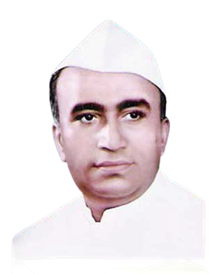

.jpg)
.jpg)








.jpg)
.jpg)
.jpg)
.jpg)


















